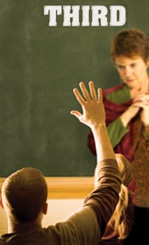Third, the Final Play by Wendy Wasserstein
A Theatrical Mirror for Our time and Us at The Huntington Theatre Company
By: Mark Favermann - Jan 17, 2008
Thirdby Wendy Wasserstein
Directed by Richard Seer
1/4/2008 — 2/3/2008
At The Huntington Theatre Company
Boston, MA
BU Theatre – at the Mainstage
The Cast
Maureen Anderman (as Laurie Jameson)
Halley Feiffer (as Emily)
Graham Hamilton (as Woodson Bull III)
Jonathan McMurtry (as Jack Jameson)
Robin Pearson Rose (as Nancy Gordon)
Certainly among the very few women in the profession, the late Pulitzer Prize-winning Wendy Wasserstein was one of America's great contemporary playwrights. "Third" is Wasserstein's last play written shortly before she died of cancer in 2005. Easily, it is among her wittiest, wisest, and perhaps most personal play. While "Third" is certainly flawed and somehow unsatisfying, the production at The Huntington is highly professional and well crafted. It is definitely worth seeing.
Set at an unnamed, elite, New England liberal arts college, this play's central character, Professor Laurie Jameson, could be considered one in the line of Wasserstein's "uncommon women" of middle age. Perhaps she is smugly more certain of her ideas than many of the playwright's other previous major female characters. Laurie Jameson is tediously ultra-liberal. She is perplexingly confronted by her questioning, highly intelligent daughter, Emily. Her dictatorial professor's perspective is diminished by Emily's familial, intellectual responses to Laurie as a mother and her personal views.
Ms. Wasserstein uses the liberal arts college environment to investigate, no, to probe and question the recently political pundit and Bush administration-led polarizing assumptions we make of ourselves, and each other, as liberals or conservatives. The context is the precious academic setting, a cloistered world somehow detached, yet strangely mirroring the world at large.
Laurie Jameson is a revered, mid-fifties, menopausal professor. She is a pioneer in her field, the first tenured, female professor at the college. Her seemingly well-ordered life and career slowly become unhinged when she meets Woodson Bull, III. His friends and family call him "Third."An articulate, and perhaps conservative, student/athlete, Third is a wrestler who, metaphorically, also wrestles with Professor Jameson intellectually and morally. She and Third face off in a series of verbal confrontations over politics, ethics, and Shakespeare. Laurie is clearly prejudiced against him and wrongly stereotypes Third as a Groton-educated, white, ruling class, greatly entitled individual. She is wrong. Bull III comes from an old family who has lost its money. Third is a scholarship student. What transpires in the play is the knocking down of prejudicial barriers that nevertheless carry consequences. Wrestling is a metaphor for all that takes place.
Jameson seems, at times, desparate and even intellectually silly in her over-confident, ultraliberal attitudes. She is also having hot flashes. Her self-confident façade starts to crack under the weight of criticism by her daughter Emily who, by the way, attends Swarthmore. Laurie's need to care for her dementia addled father, Jack seems to soften her as well. Additionally, she is overly concerned and politicaly conflicted with her cancer stricken, best friend, Professor Nancy Gordon. These things force her to begin to reevaluate many long-held beliefs. It may have been too late. By the end of the play, Jameson seems greatly diminished. Third is damaged and Emily rejects Laurie's rather strident, life philosophy. Clearly, there is a grey area in the ideas and world of our fellow human beings. The playwright demonstrates that the differences between us are really not as clear as we may think or sometimes even hope for.
The premise of the play is that long-held even cherished ideas can be questionable. Despite our own feelings, the world changes and may not fit what we thought or even what we were before. Ideas are rarely painted in simple black and white. Wasserstein reveals that academics' notions of their role as educators and molders of minds may, if handled badly, affect their students in unknown and consequential ways. However, all is not gloom and doom. As the drama unfolds there are a lot of great one-liners that keep the audience chuckling. Wasserstein wrote very strong comedy as well.
This play reminds me of my own painful learning experience at a liberal arts college in the South rather than in New England. Two professors wrongly accused me of using the same paper for both courses. Though there was no rule against it, this untrue accusation to a naive 20 year old outraged, angered and shocked me. Their purpose was perhaps to get me to transfer, put me in my place, or just assert their power? I am not sure, but it embittered me toward the college ever after. Wendy Wasserstein who, by the way attended Mount Holyoke, is demonstrating a similar notion when Jameson mistakenly tries to assert her professorial arrogance to belittle and hurt Third.
In terms of actors, the strongest, most sympathetic performances were by Robin Pearson Rose as Nancy Gordon and Graham Hamilton as Woodson Bull III. Rose's performance was at once poignant and strong while being very human. It is said that Wendy Wasserstein put a lot of herself into each of her plays. The Nancy Gordon character was clearly a reflection of Wasserstein's wrestling with cancer. Hamilton's Third character was clearly believable. This is quite a feat to pull off, and he did without a false note. Jonathan McMurtry, as old Jack Jameson, seemed to chew on the scenery. However, his characterization did underscore the Jameson family confusion. Halley Feiffer's Emily was certainly adequate but revealed no real passion or clear personality.
Most problematic was Maureen Anderman as Laurie Jameson. In a role first performed by Dianne Wiest on Broadway, the character is not a likeable one. Early on, Anderman, as Jameson, sets us off with her ultraliberal yammering. She barely starts her class lecture before uttering outrageous, left-wing, ideological nonsense. She declares her classroom "a hegemonic free zone." We just don't like her very much. She also has a revisionist view of King Lear. Daughters Goneril and Regan, who literally sold out their father, were correct. Cordelia, the devoted daughter, was a wimp, an obedient, traditional, victim. She declares that Shakespeare "vilified girls with guts." According to Professor Jameson, Lear got what he deserved. In a way, Jameson does as well.
And, perhaps, this is the point that Wasserstein was making with the Laurie Jameson character. Flawed, rather brittle, even unlovable, self-righteous, ultraliberal, yet selectively open to ideas and even people, Jameson is quite difficult to take. Therefore, Maureen Anderman performs the role superbly. We really don't like what she stands for. We really don't like her personality. And that is the point. Is she part of us that we do not like, or what we don't ever want to become? This is Wasserstein's brilliance in creating narrative characterization.
The major flaw in the play is its ending. It seems at once trying to tie up loose ends as well as just letting things float. This is not very satisfying. Yet, this may be a reflection of Wendy Wasserman's life at the end. There were loose ends, things that were left floating and certainly there was an unsatisfying conclusion. This mirrored image does not make things any better, but, maybe explains them.


